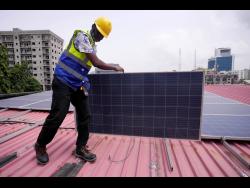- More money is flowing into African climate start-ups, but a significant funding gap remains, with the continent needing $277 billion annually to meet its 2030 climate goals.
- Private sector funding for climate tech start-ups in Africa has been growing, with businesses raising over $3.4 billion since 2019, but there is still a need to address risks like currency instability to attract more investors.
- Climate tech start-ups in Africa raised $1.04 billion last year, a nine percent increase from the previous year, signaling a growing interest in the sector despite challenges.
- Venture capital plays a crucial role in providing risk capital to nascent climate tech businesses, enabling experimentation and growth in sectors like renewable energy, carbon removal, and water management.
- Private sector financing in African climate initiatives lags behind public financing, but there is visible growth and a shift towards understanding the economic benefits of climate adaptation solutions, attracting more diverse funding sources.
Unlocking Investment in African Climate Start-ups
In recent years, the landscape for African climate start-ups has seen a significant shift in funding opportunities. The emergence of innovative solutions to address climate challenges has attracted the attention of investors, leading to a growing influx of capital into the sector. However, despite this positive trend, there still exists a substantial funding gap that needs to be addressed to propel these start-ups towards sustainable growth and impact.
The Changing Ecosystem for Climate Tech in Africa
Ademola Adesina’s journey with Rensource Energy reflects the evolving landscape of climate tech start-ups in Africa. When he first ventured into the sector in 2015, raising funds was a daunting task due to the nascent nature of climate tech in the continent. However, as the ecosystem matured and more venture capital firms showed interest, the funding scenario began to improve. Adesina’s experience highlights the importance of perseverance and networking in securing the necessary resources to fuel innovation in the climate tech space.
The funding for climate tech start-ups in Africa has been on an upward trajectory, with businesses raising over US$3.4 billion since 2019. This influx of capital is a positive sign of the growing investor interest in supporting sustainable solutions to address climate change. Despite the progress, there is still a substantial gap to bridge, with the continent requiring US$277 billion annually to meet its climate goals by 2030. To unlock this financing and address the funding disparity, African countries need to mitigate risks that deter investors, such as currency instability, and broaden the scope of climate sectors that attract funding.
Related Video

Driving Innovation and Impact through Investment
The investment numbers for the climate tech sector in Africa paint a promising picture, with start-ups raising US$1.04 billion last year alone. This growth is significant, considering the challenges posed by the global economic landscape. Venture capital firms play a crucial role in providing risk capital to nascent businesses, enabling them to experiment and innovate in the climate tech space. The willingness of VCs to invest in high-risk, high-potential ventures underscores their pivotal role in driving innovation and impact.
In sectors like renewable energy, carbon removal, land restoration, and water and waste management, climate tech start-ups are pushing boundaries and reshaping the sustainability landscape in Africa. The success stories of companies like MAX and Kubik highlight the catalytic role that venture capitalists play in propelling these ventures towards scale and impact. By bridging the gap between traditional and non-traditional sectors, these investments are paving the way for transformative change in industries like waste management and construction.
Addressing the Financing Disparity and Embracing Collaboration
While venture capital remains a key source of funding for climate tech start-ups, other financial institutions and private equity firms are also actively supporting climate initiatives in Africa. However, private sector financing still lags behind public financing, signaling the need for increased collaboration between different stakeholders to mobilize resources effectively. By blending private and public sector funding, innovative financing models can be developed to de-risk investments and attract more capital into the climate tech sector.
The economic benefits of climate adaptation and solutions are becoming increasingly apparent to investors, driving a shift towards more diversified funding approaches. The potential for returns on investment in climate tech is fueling investor interest, as evidenced by the growth in funding for start-ups like Wetility. As we look towards the future, a concerted effort is needed to align private and public sector interests in financing climate initiatives and fostering sustainable growth in the African climate tech ecosystem.
The rise of African climate start-ups signifies a new era of innovation and impact in addressing climate challenges. While progress has been made in securing funding for these ventures, there is still a significant gap that needs to be bridged to accelerate growth and sustainability. By fostering collaboration, embracing diverse funding models, and driving innovation through strategic investments, the African climate tech sector has the potential to drive transformative change and create a more sustainable future for the continent.
Links to additional Resources: